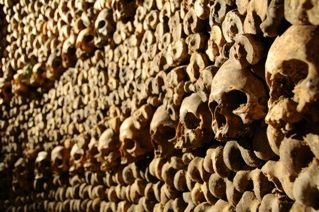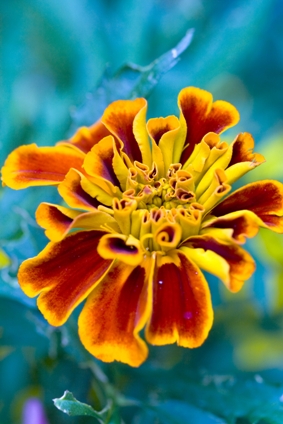The overcast sky moved quickly over the frozen earth as the end of another year slipped silently away. Films were run, one-by-one the kids played with their new games and toys and we all read lots of books. The past few days have been a delight of relaxing by the multi-colored fire of the decorated tree as our ambitious plans for entertaining and visiting local museums evaporated into a happily ensconced domesticity. I smiled foolishly at my gift of an autographed photo of David Tennant – the best Dr. Who ever; gazed at some nature prints I received – one a beautiful, old Persian hunting scene; cooked a wonderful Moroccan meal featuring lemon and cumin meatballs over caraway-flavored couscous with baba-ganoush, home-baked bread and a tomato and cucumber salad with an olive and lemon dressing. I also reread the travelogues of the great medieval travelers Marco Polo and Ibn Battuta yesterday, simply because I love them. Those are two of the books that I return to every five or ten years or so. And each time I revisit them, I learn something new.
This time, I was struck by the fact that Battuta managed to avoid the Black Death, not once, not twice, but at least three times during his travels. Furthermore, fear of the plague quite directly determined the route of his journey several times. The first time he encountered the plague, he was kicking around in Southeastern India in 1341 after a disastrous failed coup attempt in the Maldives and trying to find passage to China. The epidemic was sweeping though Tamil villages and killing people within a matter of one to five days. Although Battuta falls ill at this time, he describes malaria-like symptoms and not those caused by the bacterium Yersinia pestis.

He avoided plague in Damascus and left sometime after July 1348 and moved southward though one depopulated village after another into Palestine and Jerusalem and eventually to Alexandria where the plague was finally subsiding. He moved though Cairo which was still in the grips of the epidemic, then up the Nile to Upper Egypt and across the Red Sea to Jeddah and on to Mecca where he performed the ceremony of the tawaf around the Holy Ka’ba in late 1348 and praised God that he has been spared.
The third time he avoids the plague, was after he had returned home first to Fez and then to Tangier and took a short trip into Muslim Spain. Plague was still raging in Gibraltar area. Although he fell ill during his sojourn to Spain, it was with another bout of the malaria that had been making him periodically ill for many years.
Battuta never mentions what – other than God’s grace – protected him from contracting plague, but it could be that he followed the advice of Muslim physicians. Now, to be sure, Muslim doctors were at this time in history, some of the best doctors in the western world. They had inherited the Galenic tradition of medicine from the Greeks and advised their charges to clean their homes with vinegar and rosewater and eat plenty of pickled onions, black pepper and dishes flavored with verjuice – a highly acidic liquid derived from the pressing of unripened grapes, and often mixed with lemons or citrons and sorrel or other herbs. Other potions to ward off the disease included one made of marigold petals and crushed eggshells.

Interestingly, verjuice is still used fairly commonly in many Levantine and Maghreb cuisines and in Persian cooking as well – where it is used to give a sour zing to meat and vegetable stews. It is also an ingredient in real Dijon mustard, probably entering France via Muslim Spain. Marigold is also commonly used in Western Asian cooking, and some say the flavor approximates fresh turmeric – the anti inflammatory drug (. . . I mean spice) from the Indian subcontinent. Indeed, the whole study of medicine began as a subset of the art of the kitchen with the earliest books on leechcraft and herbs being barely distinguishable from cookbooks. After I completed my graduate degree, I spent many a happy hour in the New York Academy of Medicine’s rare books collection – pouring over some of these works.
It’s odd, at the time I wasn’t nearly as interested in cuisine as I am today. I was already a good cook who experimented widely with international foods – but cooking wasn’t as important to me as it is today. I was researching at the Academy to try to come up with a topic of inquiry for my research fellowship at a nearby hospital. Funny how life’s experiences introduce you and prepare you for events and actions well in advance of their happening. With the vantage of age, I’ve come to think that life is less linear than a cyclical or even a stochastic jumping from point to point – without a guiding purpose. I used to envy people who had a life plan and achieved their goals on more or less of a set schedule. Now I feel sorry for them and wonder if they ever think about the adventures they are missing because of the artificial structure they are imposing on their passage through the world.
Ibn Battuta returned to his native Morocco after he had turned 45 years old and had spent more than half of his life traveling to the farthest reaches of the known world. At some times he was honored as a senior scholar and jurist and lived as a wealthy man and at others, he lost everything to pirates, bandits or bad political choices and had to rebuild his life on the road literally from scratch. For him, the journey was the thing as he crisscrossed the globe, chronicling life in the medieval Muslim world and beyond its borders in cosmopolitan China and the Pacific Islands. (Words by Laura Kelley. Photo of Christmas Tree by Laura Kelley; photograph of skulls and bones by Icara |Dreamstime.com; and photograph of Marigold by Stuart Monk | Dreamstime.com)
